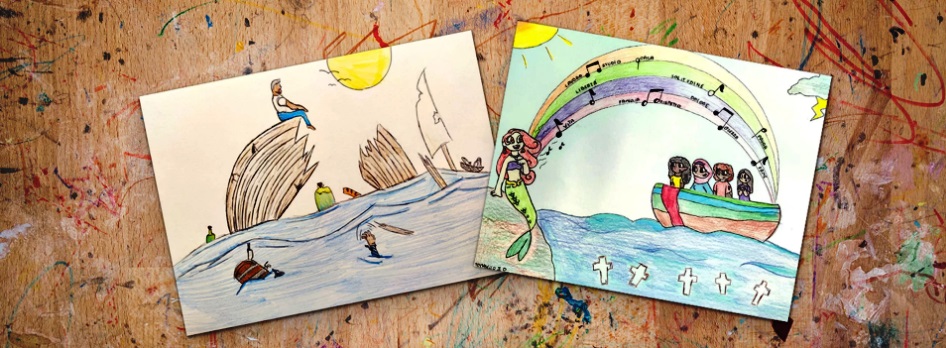Skwota_Thadeus Obadha Odenyo
“My mama, my mama”, Skwota cries for help. An earth-moving monster
is in the neighbourhood and is wreaking havoc on the helpless plastic
and carton houses that the humble residents of sweet valley have called
home for more than thirteen years. The residents received eviction notices
a week ago. In spite of the timely notice, most of the residents had
nowhere to go and opted to wait for the bulldozer to wrench them out.
Still some of them hoped that a miracle would happen and that the eviction
notices would go away. “Here, here and here”, she tries frantically
to gather all her possessions. The bulldozer can be heard groaning
less than fifty yards away. The weak houses succumb to the heavy machine
as the owners flee to safety. The chickens can be heard squawking
as they scamper away from the jaws of the dreadful monster.
Outside the house, club wielding, grimfaced policemen are on standby.
They are a symbol of oppression and brutality against the weak.
They stand in a mosaic of emotion and authority watching the evacuees
make any attempt to resist eviction. The occupants of the valley
escape out of their unstable houses. Their animals and children are at
a great risk of being trampled under by the heartless monster. In the
first house, a five year old boy was crushed to death as he went back
to pick his toy. The policemen thought that it was a dog and ignored
it all together. The boy’s mother had gone upcountry and left him under
the charge of a cousin who left the previous evening to attend a
disco in the neighbouring slum. Little did he know that the monster
would strike at midnight.
“Father in heaven, why me, why is this problem never ending?”, a
neighbour two houses away can be heard cursing. As the bulldozer finally
begins to wrench Skwota’s house, she has bundled together her
assets into a sisal sack. “I have saved my house, I am lucky to have rescued
my house from the government”, she sighs with relief watching in
anger as the iron monster swallows the home she has known for eighteen
months. Skwota, a teenage woman struggles with the vicissitudes
of modern life. Having barely cleared primary school she was impregnated
by a boyfriend who fled home after discovering that her uncle was
in pursuit. Even after carrying the pregnancy for a full-term the infant
was born underweight and succumbed to the motley childhood illnesses
inherent in Africa.
The doctors said that malaria had caused foetal anaemia that devastated
the infant before birth. When her mother later died of AIDS, Swota
suffered stigma and could not find peace at home. With the prospects
of better life beckoning her in the city she left home one early morning
and boarded an empty cargo truck that took her to the city in exchange
for a sexual favour. At the time of her arrival in the city, she had nowhere
to go and was taken in by the church. She lived with one of the Christians
for two months before abandoning them one early morning. She
had met Bahati, a quarry miner who used to deliver stones for the construction
works at the church. During their first meeting, she was timid
and terrified because of her past experience but Bahati reassured her that
he was mature and would never disappoint her. On the day she disappeared
from Mlokole’s house, there was rumour that she had eloped with
one of the boys in the neighbourhood. After two weeks things returned
to normal and she started going to church with the other Christians.
Skwota’s husband was working at the chimba quarry until he met his
untimely death. The day was ominous from dawn and Skwota even told
her husband that she had a bad feeling about the fortunes of the day. She
had dreamt that bees had stung her husband. Her dream was so vivid
that she was able to narrate the details of what colour of apparel her husband
was wearing. “You see why you should go to church instead of
going to work today”, she had insisted on that day in the morning.
“Dreams are the babies of idle minds”, her husband dismissed her with
a light touch. Bahati proceeded to work hoping that he would return home
in the evening to be with his wife. Wrong place at the wrong time, he
had finished work early enough and was at the marketplace buying
food when gunshots began to fill the air. Skwota cannot forgive the bullet
that fatally wounded her husband.
As she struggles to pull her sack uphill, tears begin to glide down her
cheeks, “if only Bahati were alive…”, she sighs deeply and a cascade of
raging tears pour down her cheeks. “…Perhaps this load would have been
lighter”, she mumbles. As she wrestles with her thoughts, the sack finally
accepts to glide gently against the opposing gravity. “We are the
children…, we are the children…”, she sings a Michael Jackson song.
All her immediate neighbours left in time but she could not leave, as
she had not a place to go. “They were good people because they had
helped her inter her husband’s remains, may be they would have helped
with this problem as well”, she thinks aloud, as cacophony fills the air
and a storm formed by the wrestling monster drives the dust airborne.
There is mixed smell of putrefaction and food as well as perfumes as
the manmade monster flattens the houses in sweet valley. The ground
is shaking sending chills of fear down the spines of onlookers. The men
in helmets move in unison as they watch out for rebels. The somnolence
has humbled all the residents and the policemen expect no resistance.
Then suddenly a man comes running claiming that his goat has been trampled
by the monster.
“No, no way… no way”, he cries repeatedly. The loss of his only possession
is too much to bear. The policemen have difficulty subduing the
man, as he knows the terrain like the back of his hand. He skips from
left to right sending the policemen into a running frenzy. When they finally
catch him, they club him senseless. He lies down in a pool of blood,
writhing in agony. He was the only dissenting voice and now calm returns
and the cauldron can continue unabated.
The memories of the day are still fresh in her mind and events like this
demolition invoke feelings of sorrow and agony in Skwota’s heart. On
that day, she had to bribe the security guard at the cemetery. The grave
had to be dug at midnight and the burial took place at three o’clock in
the morning. The night was overcast and one could barely see a glowworm.
Infernal stillness engulfed the air casting a sepulchral tempo
around the mourners.
“Please take this and let us bury my husband”, she recalled with tears upwelling,
drenching the wells formed by the previous bouts of lacrimation.
“No, no, no… Skwota, I will not take anything less than two thousand
shillings, you know that I am only the collector, this money all belongs
to my boss”. Solja asserted as he paced into the darkness. Skwota had
collected four thousand shillings and had used half the amount to pay
the driver. Yeye the driver had asked for more money but when he saw
that Skwota had a second option he accepted to steal the car from his
boss to ferry the mourners to the cemetery. “I am risking my job because
you are my neighbour and a good person. I wish I could do more”, Yeye
said as he pocketed the money.
“Solja, you have been a good neighbour to me and I will not do anything
to make you unhappy. I will make it eighteen hundred, please accept
this amount”. As the undertakers pulled out the eighth foot of the
loose earth from the pit, they encountered the carcass of another man.
“Let us not stir those that are at rest, for we do not know what they might
smite us with”, the lead undertaker stated. He signaled at his cohorts to
cover the bones with a layer of earth and prepare to lay Bahati to rest.
The undertakers were used to these encounters and were not perturbed
at all. The grave had to be distorted to appear like a flower garden to
evade detection by the city council guards. The deceased was carried
on a pickup truck disguised as a building company truck. The body was
wrapped in several layers of shroud and concealed beneath a heap of
manure and flowers.
“Ok, ok Skwota, I know that you are a widow, I can come for the remaining
amount later”, he said as he did the money in his socks. “Where
is Kago?”, he said referring to the corpse. From this point on, it was Solja’s
onus to dispose the body surreptitiously.
“Over there, near the Mugumo tree”, she said holding Solja’s hand and
pointing with his arrow. “Go, tell the mourners to leave and I will do
the remaining work”, he said.
As she walked to the pickup she stumbled on a tombstone and almost
fell. “Uugh”, she woke up from her slumber. It was just a dream, a very
sad dream. The bulldozer was on the southern side of the valley, groaning
as a trail of destruction graced the landscape. The bats could be heard
chirping as they ambushed nocturnal moths dancing in the earthmover’s
headlights. It was barely one o’clock in the morning and the wind was
gently dragging clouds towards the acme of the valley. As the air temperature
dropped, light showers began to fall.
“Where is the government? Where is the government?” Jirani shouted
as she covered her baby with an extra layer of blanket, “my son is sick
and the government is killing him”, she said as tears rained from the top
of her open mouth. Jarani’s husband had died of AIDS two months ago.
Chwora had suffered for two years, sapping all the family savings. A
month before he died, they owed the shopkeeper five times the household’s
total income. Dukani, the shopkeeper had sympathized with
Chwora’s family as they came from the same village back at home. As
the credit levels went up he even had to borrow to keep the shop stocked.
Dukani respected Chwora for having invited him from the village and
assisting him to establish in the neighbourhood. One day before Chwora’s
death, Jirani came to the shop for milk and Dukani was very saddened
by the poor prognosis that he began to cry. “I know that only our
father in heaven gives and takes life”, he said with tears soaking his overgrown
moustache. “I have never known a brother and I keep praying
for his recovery”, he added, as tears helplessly invoked mucus to stream
down his noses trills. “I hope that you will be strong enough to accept
the final verdict, he has lost his will to live and all that is left is emptiness”,
Jirani stated with a melancholic tone as she took the packet of
milk. “May a better tomorrow be our hope against the ravages of today”,
Jirani would say taking home an extra unit of milk owed on credit.
While lying on his deathbed, Chwora knew that his wife was approaching
delivery. His face sickly and sallow with death. His cheek
bones protruding and eyes sunken in the sockets. He attempted to
mutter a word “mmm…”.
“Chwora, please rest”, she said with sympathy. Little did she know that
he was saying goodbye. When Jirani came to the hospital the next day,
there was an ominous cloud of melancholy in the air. Her husband had
died at three o’clock in the morning. She believed that at the same time
the spirit of death visited her in a dream and she could see her husband
ascending to the throne of the departed.
The cold air slapping her scarf repeatedly, she was barely twenty-three
years old and had already learnt very much from the school of life. Jirani
moved to the slum to stay with friends after her aunt’s death. Unlike
Skwota, Jirani had been in the city from childhood. Hardened by
the vagaries of city life she was resilient and strong.
“Poverty, AIDS and the government, all are my enemies”, she spat. “If
only my family weren’t poor, AIDS wouldn’t have stolen my husband”,
she explained. Jirani was aware that death had robed her and she wasn’t
scared of it anymore. “Toto you will be all right, I will take you to
the doctor and all will be well”, she said holding the baby much closer.
As dawn approached, the Turaco could be heard squealing and the owl
hooting ushering in a new day. The night was particularly long and a
new day was eagerly awaited. Skwota had sat on the sack containing
her possessions for an hour and she was already feeling tired as the sack
had jard protruding objects. At three o’clock in the morning she wanted
to relieve herself as was routine. She walked down the valley to the
trench and relieved herself. The way down the trench was littered with
human waste, it was even worse in the darkness. Every two steps that
she made landed on top of festering dung.
May the new day come for I slept on an empty stomach, so the sages
say to acknowledge the arrival of a brand new day. For the residents of
Sweet valley, the new day was dressed in gloom and death. The littered
landscape defined the remains of their home. If the laws were for the
poor, if only the laws favoured the poor then they would live in peace.
The livestock that survived the nocturnal ambush were sickly and limp
with open wounds bespeaking the commotion that attended the previous
night. Like Egypt after the firstborns were murdered, sweet valley
was bleeding and writhing in pain. Skwota dragged her sack to the
neighbouring slum. The journey was long and winding and each step
brought the promise of victory and hope. The landscape was picturesque
with green water and massive garbage dumps. The ground was moist
with fresh urine and the sidewalks dotted with human dung. “In this world
full of wars, I cannot afford to lose”, she said to herself. “My will to live
is much stronger after every encounter with the bulldozer”, she said smiling
with tears dropping on her sack. She clutched her hands around the
sack in a hugging poster. Looked back at the distant sweet valley where
she had overcome an encounter with death. When midday came pangs
of hunger gripped her evoking her tears to flow free. If only the bullet
did not take his life, we would have struggled together”, she said as sleep
brought her to a peaceful rest.






